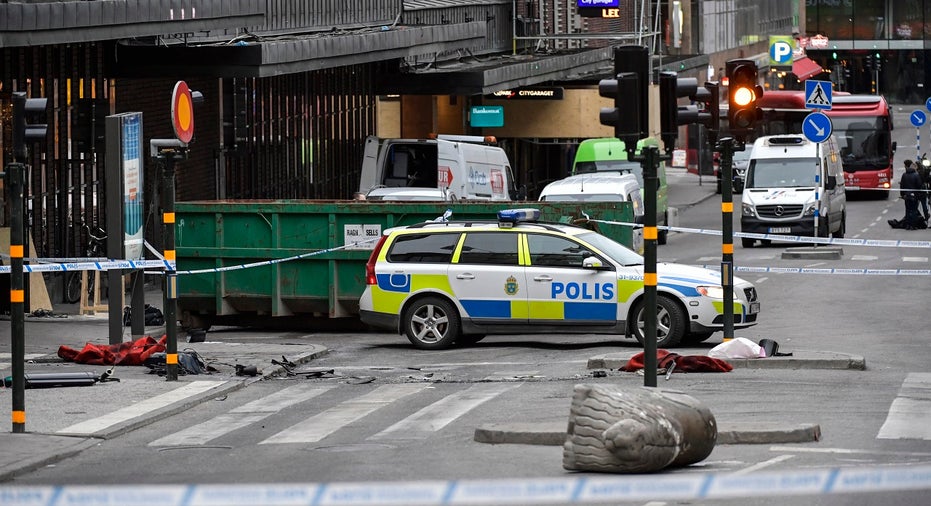Uzbek Man Main Suspect in Swedish Truck Attack That Killed Four

A 39-year-old Uzbek man being held in custody is the suspected driver of a hijacked beer delivery truck that ploughed into crowds in central Stockholm, killing four people and wounding 15 in an apparent terror attack, police said on Saturday.
The man, previously known to Swedish intelligence services as a marginal figure with no clear links to extremist groups, is suspected of mowing down pedestrians on a busy shopping street and smashing through a store front on Friday.
"Nothing indicates that we have the wrong person, on the contrary, suspicions have strengthened as the investigation has progressed," Dan Eliasson, head of Sweden's national police, told a news conference on Saturday.
The man, detained on Friday night on terrorism charges after the attack in the heart of the capital, appeared to have acted alone but "we still cannot rule out that more people are involved," he said.
Police raided several addresses in the Stockholm area on Saturday, according to TT news agency and tabloid Aftonbladet, but told Reuters no further arrests in connection with the attack had been made.
A Reuters witness saw police wearing protective masks carrying out a search at an apartment in a southern Stockholm suburb.
LAWYER MET WITH SUSPECT
Court-appointed lawyer Johan Eriksson told Reuters he had met with the suspect on Saturday but declined to give further details about his client.
Police did not name the detainee, but said he was from the central Asian republic of Uzbekistan and that he had seemed peripheral in intelligence reports.
"We received intelligence last year, but we did not see any links to extremist circles," Sapo security police chief Anders Thornberg said.
Eliasson said there were "clear similarities" to an attack last month in London in which six people died, including the assailant who drove a hired car into pedestrians on a bridge.
Vehicles have also been used as weapons in Nice and Berlin in the past year in attacks claimed by Islamic State.
There was no immediate claim of responsibility for the attack in Sweden, which until now had been largely immune from major attacks and where many take pride in an open, democratic society.
"I think it was just a matter of time, but still one doesn't think it will happen," Cecilia Hansson, a 25 year-old nurse, said. "It's still unreal when it happens this close."
Police said they had found a suspicious device in the vehicle, which ended up rammed into the Ahlens department store, but said they did not yet know if it was a homemade bomb, as reported by public broadcaster SVT.
Local authorities in Stockholm, where flags flew at half mast, said 10 people including a child were still being treated in hospital, with two adults in intensive care.
Sweden will hold a minute's silence at midday (1000 GMT) on Monday to mourn the dead. Police said they were maintaining a heightened presence, fearing copycat attacks.
FLOWERS, DEFIANCE
A gaping hole in the wall of the store showed the force of the impact from the truck, which was removed overnight for examination by forensics experts, and people gathered to pay their respects and leave flowers.
Ahlens said it would open part of the store on Sunday.
Prime Minister Stefan Lofven visited the site and struck a defiant tone: "All of us feel anger over what has happened, I also feel the same anger, but we also need to use that anger for something constructive and go forward."
"We want - and I am convinced the Swedish people also want - to live a normal life. We are an open, democratic society and that is what we will remain."
Sweden's King Carl Gustaf, who broke off a trip to Brazil and quickly returned home after the attack, addressed the nation in a televised speech from his home at Stockholm's palace.
"Those of us who want to help are many more than those who wish to harm us," said the monarch, wearing a dark suit and black tie. "Sweden is, has long been and will continue to be a safe and peaceful country."
The attack was the latest to hit the Nordic region after shootings in the Danish capital Copenhagen killed three people in 2015 and the mass attack in 2011 by far-right extremist Anders Behring Breivik killed 77 people in Norway.
A failed suicide bombing in December 2010 killed an attacker only a few hundred yards from the site of Friday's incident.
IMMIGRATION
For decades, Sweden has been among the most generous nations to immigrants. But some Swedes are having second thoughts after more than 160,000 people, many from Syria, applied for asylum in 2015 in a nation of just 10 million.
Sweden has since tightened its borders and asylum numbers have slowed to a trickle. Support for the opposition far-right Sweden Democrat party, which links worries about education, welfare costs and crime with immigration, has continued to rise.
"We have warned about such incidents ... but we do not want to score any political points today," Julia Kronlid, vice chairman of the party, told Reuters.
Islamic State claimed responsibility for an attack in Nice, France, in July 2016, when a truck killed 86 people, and a truck attack on a Christmas market in Berlin in December that killed 12.
In last month's attack in London, a man drove into pedestrians on Westminster Bridge near Britain's parliament and then stabbed a policeman to death before being killed himself.
In February U.S. President Donald Trump falsely suggested there had been an immigration-related security incident in Sweden, to the bafflement of Swedes.
Neutral Sweden has not fought a war in more than 200 years, but its military has taken part in U.N. peacekeeping missions in several conflict zones, including Iraq, Mali and Afghanistan.
(Reporting by Stockholm newsroom; writing by Simon Johnson, Alister Doyle and Terje Solsvik; editing by Alexander Smith, Ros Russell and David Evans)



















